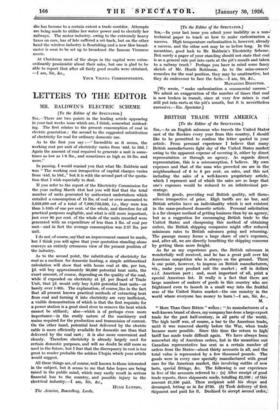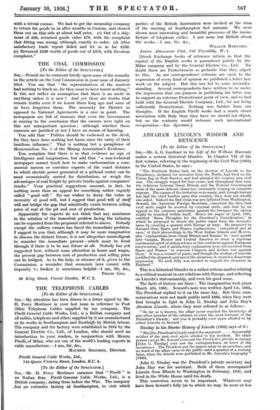BRITISH TRADE WITH AMERICA [To the Editor of the SPECTATOR.]
Sra,—As an English salesman who travels the United States east of the Rockies every year from this country, I should like to be permitted to confirm the letter quoted in your article. From personal experience I believe that many; British manufacturers light shy of the United States market( owing to the apparent expense of covering it, either by direct! representation or through an agency. As regards direct: representation, this is a misconception, I believe. My own expenses and that of the man who preceded me are in the neighbourhood of 6 to 8 per cent. on sales, and this not including the sales of a well-known proprietary article, which I represent and of which the sales are so large that one's expenses would be reduced to an infinitesimal per- centage.
British goods, providing real British quality, sell them-) selves irrespective of price. High tariffs are no bar, and British articles have an individuality which is not existenti in the mass-produced domestic article. Personal solicitation, is a far cheaper method of getting business than by an agency,' but as a suggestion for encouraging British trade to the United States and cheapening this method of obtaining orders, the British shipping companies might offer reduced minimum rates to British salesmen going and returning.) The passage money forms a large share of one's expenses,' and, after all, we are directly benefiting the shipping concerns by getting them more freight.
As far as my experience goes, the British salesman wonderfully well received, and he has a great pull over his American competitor who is always on the ground. There is one point, however, to impress on British manufacturers 1 viz., make your product suit the market ; sell in dollar c.i.f. American port ; and, most important of all, print a', special American list. It really is a fact that there are; large numbers of makers of goods in this country who are frightened even to launch in a small way into the fruitful seas of the United States market—the one country in the world where everyone has money to burn !---I am, Sir, &c.,
M.
"More Than Once Bitten " wrkes "As manufacturers of a well-known brand of shoes, my companyhas done a large export trade for the past half-century, in all parts of the world., The high tariff was, of course, a bar to the American trade,:, until it was removed shortly before the War, when trade! became more possible. Since this time the return to high tariff has made trade difficult again. We have always been, somewhat shy of American orders, but in the meantime our Canadian representative has sent us a certain number of orders from the States—about thirty accounts in all, and the total value is represented by a few thousand pounds. The goods were in every case specially manufactured with great care for the American market, this involving outfits of new lasts, special fittings, &c. The following is our experience in five of the accounts referred to : (a) After receipt of good trade reports, three shipments made, totalling £2,100; of this amount 21,350 paid. Then reciPient sold his shops- and decamped, letting us in for t750. (b) Took delivery of first, shipment and paid fOr it. Declined to accept second order41,
with a trivial excuse. We had to get the steamship company to return the goods to us after months in Custom, and cleared them out on this side at about half price. (c) Out of a ship- ment of £96, returned goods value £76, with the complaint that fitting was wrong, although exactly to order. (d) After satisfactory trade report failed and let us in for £250. (e) Returned £240 worth of goods out of 1370, with frivolous complaint."



















































 Previous page
Previous page